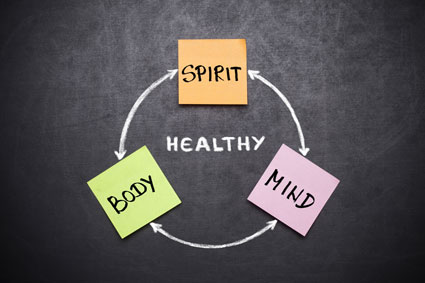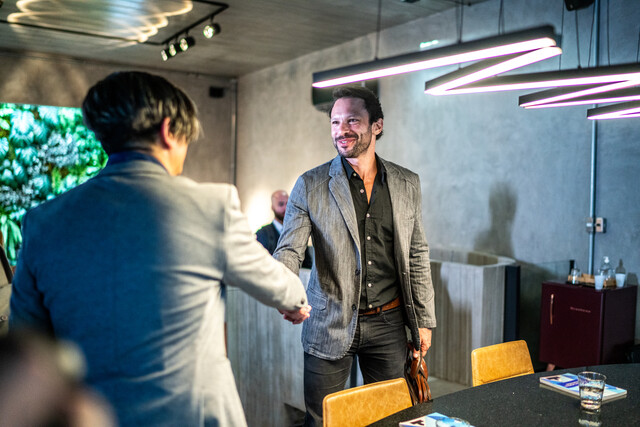When we hear the word "creative," the first thing that comes to most people's minds is "artist," "musician," "actor," or the like. We may think of our neighbor, who always seems to be able to create the most amazing gifts or decorations with wire, crepe paper, and an empty paper towel roll (okay, that's a bit of an exaggeration, but you get the idea).
Merriam-Webster defines creativity as, "the ability to make new things or think of new ideas." In other words, creativity is the amazing work of a talented artist, someone late for work who finds a new route around a traffic jam, and everything on either side, and in between. Creativity is a thought, an action, a process, and an attitude. With such a wide range of possibilities, you're probably already being creative on a daily basis and don't even realize it!
Acknowledging Your Creativity
Most people go through their busy daily lives without much thought to the "little things" they're actually doing. Who has time? You just do what you do, right?
Right. And that is reason to celebrate!
Consider your average day. If you're a stay-at-home parent, your day probably begins with waking up before the rest of your family. After attending to your own needs, you wake everyone else up and make sure they start getting ready for the day, while you prepare breakfast or attend to other chores. After ensuring everyone is fed and ready for the day, you send them off to their daily activities. A typical routine – one you created. Anyone stepping into your place for one day would create a disaster!
Think about that for a moment. Chances are, no one handed you a textbook when you reached adulthood, outlining how to run your day. You may have taken some cues from others surrounding you, such as parents, when you were young, but you've modified these routines over time to suit your situation and lifestyle. Your routine for a successful morning/day is your own creation.
Admittedly, while this is true, it isn't very inspiring! How is one supposed to find their own inspiring creativity amidst the hustle and bustle of everyday life?
Exercise for recognizing your creativity
This is a simple exercise for recognizing your creativity. Most people are very creative and don't even realize it!
We've already mentioned effective daily routine as one source of creativity. Expanding on that, identify other areas where you excel, or activities you truly enjoy (you'll want to make a list on paper). Things you excel at, or enjoy doing, are usually an expression of your natural creativity. Some examples:
Home decorating and/or furnishing
Creative organization solutions (even if you got the ideas from the Internet, you researched it, put it together and made it work for you)
Fixing broken items with whatever is handy, and making them work again
Creating fun activities at little or no cost for your family
Making small gift bags or baskets for special occasions
Baking birthday cakes or other treats
Singing
Making people laugh when they're feeling down
Writing poetry (you don't have to be good at it to be creative!)
Crafts
Putting together a fabulous birthday or Christmas, complete with gifts, on a tight budget (it takes a lot of creativity to do this!)
Cooking a nice meal from whatever you have in the kitchen
Fixing your vehicle after simply watching a brief tutorial on the Internet
Having a method for folding laundry which is quick and space-saving
Many of these examples sound "ordinary" – and they should. Creativity is not something that should stay bottled up inside, reserved for "the right moment" or "special occasions." Personal creativity, by its very nature, needs to come out and play! And allowing your creativity to play requires that you overcome obstacles, such as harsh self-judgment (we are all our own worst critics!), and that you learn how to accept compliments.
Why We Shy Away From Our Creativity (and How to Overcome Those Obstacles)
The biggest obstacles to creativity are self-judgment (sometimes called "the inner critic), self-doubt, fear of failure, and pressure to conform.
Creative thinking is "thinking outside the box." Unlike critical thinking, which is linear and seeks one correct answer, creative thinking is visual and associative, and seeks alternative answers, often more than one. (When people are daydreaming, they are involved in creative thinking.) As adults, we want to feel mature, in control, and intelligent. Unlike childhood, when daydreaming was considered a worthwhile activity (although not by the adults surrounding you!), your adult mind thinks of daydreaming as time-wasting, silly, or immature. It may be all of these things, but primarily it is creative. Let's discuss ways to abolish the creativity-killers!
Self-judgment: There are a few things one can do to silence the internal critic. One method is to simply ignore it. Push the negative, critical thoughts aside and continue with your musings. If, however, you are the type of individual who can't help but turn your attention toward the internal critic when it speaks, allow it a moment to squawk, then tell it, "Thank you for sharing," and turn your attention back to your creative thoughts.
The first several times you attempt either of these techniques, they may not work. Your inner critic may successfully derail your creative process. Don't despair! With practice, you'll become much better (and faster!) at silencing your inner critic. It takes time and repetition to break the habit of self-criticism, but it is worth the effort!
Self-doubt: Remember the childhood story, The Little Engine That Could? He was small (and the last choice for the task) with a heavy load to carry over a treacherous mountain pass. No one believed he could do it, but he kept repeating, "I think I can," until he completed his task when, smiling, he said, "I thought I could!" The purpose of this story illustrates how belief can create success. (This also means, if you focus on failure, you will succeed at failure!) It sounds simple, but many creative ideas never happen due to false beliefs such as, "I'm not smart enough," "I'm not a creative person," or "Someone else has probably already figured it out." These thoughts need to be dismissed in a manner similar to those used for self-doubt.
Fear of Failure: Fear of failure can have many sources. You may fear others will make fun of, or mock, your ideas -- perhaps those around you have a history of doing so -- or that you'll make a fool of yourself. Congratulations, you're human! The Wright Brothers, who were not aviators, were doubted as to their ability to create a "flying machine." Their first flight lasted all of 12 seconds, which could be seen as a failure, despite its historic importance. Twelve seconds, and only 20 feet above the ground – what we would now call an "unsuccessful takeoff." Yet it was a landmark achievement, and the duo learned much from the "failures" of that flight. None of it would have taken place if they'd given in to fears of failure.
The key to turning failure into a useful stepping stone is to learn from the failure in order to improve your original idea. Feeling fearful when contemplating trying new things is quite normal; the trick to overcoming fear blockages is to acknowledge your fear and pursue your creative endeavors, regardless. As with the other "blockage removals" discussed above, this will become easier with practice.
Pressure to Conform: This can be one of the more difficult obstacles to overcome, since it's so ingrained in most people. Even those who are "non-conformists" conform to others who share their views! (Examples: Alternative social groups, such as "goths" or hippies, punk rockers, activists.) While there are some good reasons to conform, such as to avoid legal complications, physical harm, or loss of privileges or property, "conforming" your thinking is not necessarily useful, and it certainly isn't creative.
Creative thinking can feel threatening to others who have yet to acknowledge their own creativity, or individuals who dislike nonconformity. Such folks tend to discourage others from thinking creatively. In Viktor Frankl's influential book, Man's Search for Meaning, in which he relates his experiences as a concentration camp prisoner during WWII, Frankl states, "Between stimulus and response, there is a space. In that space is our power to choose our response. In our response lies our growth and our freedom." In other words, we have a choice to ignore those who try to stifle our creativity, or we can give in to the pressure to conform and lose the opportunity to explore our creativity.
Learning to ignore the negative comments of those around you can be difficult – but why let their doubt stifle your creative self? If sharing your ideas brings derision or criticism from others, stop sharing your ideas with the naysayers and share your thoughts with other creative people, instead. Then, when your creative ideas come to fruition and the naysayers ask, "How did you do that?" you can smile and say, "I am creative, that's how!"
Accepting Praise
Many of us have difficulty accepting compliments. We discount our creation(s) as "just something I do" or downplay our talents with self-depreciating thoughts and comments. For example, Ellie loves to bake and is very good at it. Her pies are always delicious, the crusts perfect. When people praise her, Ellie becomes self-conscious and often discounts her accomplishments with self-depreciating statements such as, "The crust didn't turn out as flaky as I'd like," or "Oh, thank you, I just threw it together at the last minute. Usually my pies are better." Comments like this not only degrade the quality of Ellie's accomplishment, they're not good for her self-image and sense of self-worth, either.
Chances are, you're a lot like Ellie in at least one area of your life. Why is it most human beings feel compelled to downplay their accomplishments? Why do we feel a need to brush off our creativity as unimportant?
Likely, the answer lies somewhere in the recesses of our psyches. Consider for a moment the prevailing source for ethics and proper behavior in the western world – the King James Version of the Holy Bible. Whether you're religious or not, chances are you've been exposed to the influence of this book. Admonitions against lying, murder, stealing, disrespecting one's parents, wanting what others have, and being prideful have become ingrained concepts in society. People go to jail for stealing and murder, and people who express pride openly are typically seen as arrogant. It's no wonder most of us put ourselves down – we want to avoid being thought of as arrogant, cocky, or "too full of ourselves." Compliments make us uncomfortable, because we somehow think or feel if we accept them, we're being arrogant.
Being proud of one's talents and accomplishments and taking pleasure in your abilities in an honest way is not arrogance, it is positive self-image. Pride becomes arrogance when it is excessive, unfounded, overbearing, and/or insulting to others. So how does one strike a balance between appreciation for one's talent and arrogant bragging?
Rest assured, most of us won't turn into overbearing egomaniacs overnight just by learning how to graciously accept compliments. In fact, it will likely be very uncomfortable at first to accept a compliment at all! But as with most exercises in this course (and in life), you will improve with time and practice.
Accepting a compliment is very simple. Just say, "Thank you." That's it! No follow-up "but" statement, no self-depreciating remarks (yes, we know you want to!), just accept the compliment. You may blush, have to bite your tongue to keep from adding to your "thank you," or feel the need to run from the room, especially the first few times, but don't let that deter you. Keep practicing. With time, it really does become easier, and one day you'll find yourself saying "Thank you" without any self-depreciating thoughts at all.































